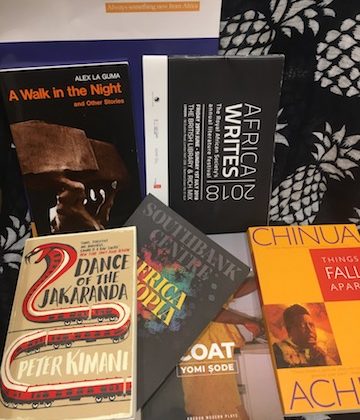Although summer is over, the joy of reading doesn’t have to end. Omusana Review looks back at some of the books and events we experienced this year. Since our launch in April, Omusana Review has been examining the work of African writers whose texts spotlight “the political.” From classic works by Chinua Achebe and Alex La Guma to contemporary writers like Peter Kimani and Clemantine Wamariya, we dedicated ourselves to looking at how these authors presented political themes. Our first column discussed Achebe’s (Things Fall Apart, No Longer At Ease, A Man of the People), Ayi Kwei Armah (The Beautiful Ones Are Not Yet Born), and Alex La Guma (A Walk in The Night and Other Stories). These texts reimagined colonial intrusion, political corruption and the way indigenous and social norms were fractured by the state. Then we took a comparative look at Tsitsi Dangarembga’s novel (Nervous Conditions) and Toni Morrison’s (The Bluest Eye), which discuss the female body as the site of authoritarian resistance. Our next column looked at Peter Kimani’s novel (Dance of the Jakaranda), which tells the story of the construction of the Kenyan railroad through the love story of Rajan and Mariam. The book explores many themes such as love, historical silence, music and nation-building.
From the collective, we moved to the personal, focusing our attention on works that highlight individualism. Yomi Sode’s critically acclaimed play COAT is a great example of this dynamic. This play explores the idea of displacement within a domestic setting; in particular, it looks at the conflicts between parental expectations versus individual aspirations. Our summer reviews ended by examining memoirs, and the impact of war on children. We reviewed (The Girl Who Smiled Beads) by Clemantine Wamariya, in company with other memoirs such as Helene Cooper’s (The House at Sugar Beach) and Ishmael Beah’s (A Long Way Gone). All three texts give first-hand accounts of surviving a civil war – whether in Rwanda, Liberia, or Sierra Leone. What strikes the reader in these narratives is the author’s willpower to give voice to many of the atrocities in hopes of serving as witness to these historical events. These books are of great importance when one considers the wall of cultural self-censorship that prevents many survivors from telling their story.
Summer in London would not be complete without mentioning all the literary festivals and events that took place this year. From Africa Writes to Africa Utopia to The Africa Centre Summer Festival, London was busy celebrating African literature, music and fashion. Some of the highlights for us were the Igbo Conference where Chimamanda Ngozi Adichie addressed the politics of language preservation in the diaspora. We then attended Africa Writes, the annual African literature festival sponsored by the Royal African Society. Fans of African literature were able to indulge in book launches with world-renowned authors, listen to expert panels, and enjoy a night of poetry and music. Listening to the Caine Prize shortlisted nominees was another super event. Nominees read from their work and answered questions at a forum hosted at the historic SOAS University. The prize was judged by well-regarded authors Dinaw Mengestu, Lola Shoneyin, Ahmed Rajab and Henrietta Rose-Innes. I will never forget how my brain completely flatlined when I saw Ben Okri and Dinaw Mengestu greet each other. It was other worldly, but i digress! Lastly, Africa Utopia at the Southbank Centre is always a must-see event. This year there was a special exhibition celebrating Nelson Mandela’s Long Walk to Freedom.
Up Next, Omusana Review is excited for autumn/winter season in which we will examine literature centered on “the immigrant.” Our reviews will discuss how African authors have written about “the immigrant” experience inside and outside the continent. We will be dissecting different literary genres from fiction to non-fiction, plays and film. Also, we can’t wait to attend the various literary events taking place this autumn/winter beginning with the London Literary Festival and Somali Week Festival in October. Happy Reading!


